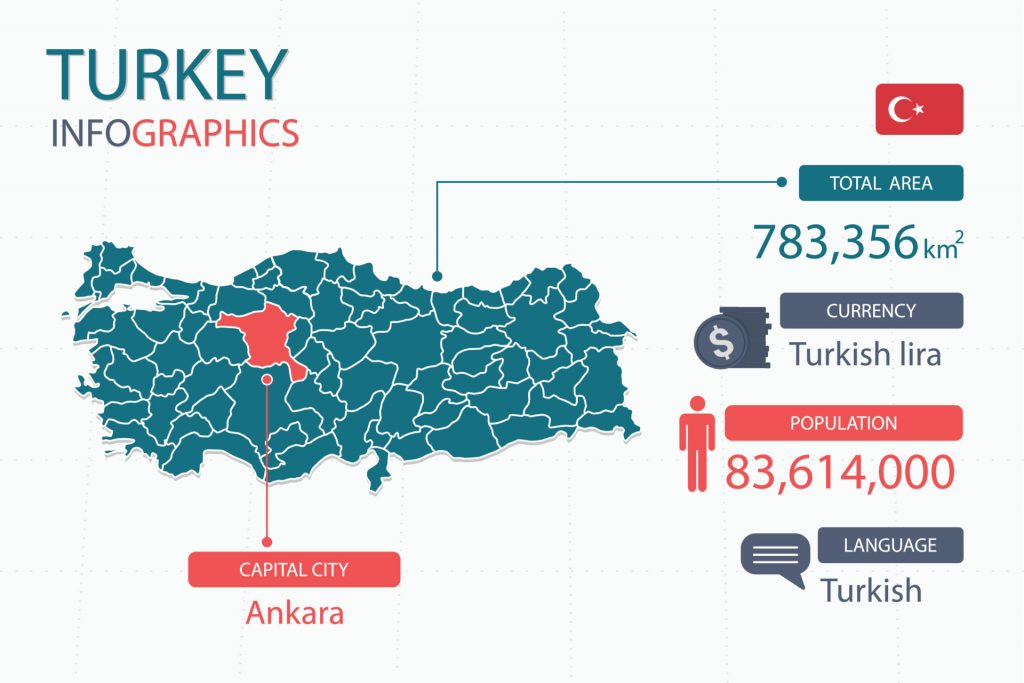The origins of the Turkish Language
Turkish is a Turkic language; other members of this family include Azerbaijani, Kazakh, and Uyghur (spoken by a minority group in China). While the basis of its vocabulary is of Turkic origin, there have been notable vocabulary influences from a variety of languages. Much of the influence stems from Arabic and Persian as Turkic peoples have historically had close contact with Islam. Other influences include Armenian and Greek, as well as a number of European languages, especially for more technical vocabulary.
Turkish is written with an alphabet based on the Latin Script. Modified from the original, it is used exclusively for the Turkish language. This alphabet was adopted rather recently in its long linguistic history, in July of 1928. It includes 29 letters total, with special characters including Ç, Ş, Ğ, I, İ, Ö, Ü to represent native Turkish sounds. It is written from left-to-right and includes common features of European punctuation. Before 1928, the Ottoman script was used, which is basically a Turkish form of an Arabic script.
Historically, the contemporary Turkish language stemmed from Old Turkic languages. Between the 6th and 11th century, there was a large expansion of Turkic tribes, especially across Central Asia. At this time, Turkic languages spread as well. Most notably, Oghuz Turks brought their particular variety of Turkish into Anatolia, which is a direct ancestor of the Turkish spoken today. By the end of the 11th century, the first comprehensive Turkic language dictionary had been written and published.

By the time the Ottoman Empire had emerged, there had already been influences to the language due to the adoption of Islam by Seljuq Turks and the Kara-Khanid Khanate; both groups are considered as both the ethnic and cultural ancestors of the Ottomans. Linguists classified the Turkish of this time period into two distinct flavors, an everyday Turkish called “Rough Turkish” and Ottoman Turkish. The latter was the administrative language of government at this time, which utilized a large collection of loan words from both Arabic and Persian, languages that are strongly tied to Islam. During the Ottoman Empire (1299-1922), both the literary and official language was this variety of Turkish, which was a mixture of the previous iteration of Turkish, Persian, and Arabic. Interestingly enough, Ottoman Turkish would be largely unintelligible to the everyday Turkish spoken during this period, and also to the Instanbul Turkish spoken today. “Rough Turkish,” which was spoken by the masses, more closely resembles contemporary Turkish, and was in fact the basis for the modern language.
Modern Turkish emerged after this period, especially after 1932, when the Turkish Language Association was established. The primary task of this institution was to conduct research on Turkish, with the goal of instituting a language reform, especially to replace loan words with Turkish equivalents. The language reform can be considered “successful” in terms of the replacement of vocabulary that did not have originally have Turkic roots, but at the same time, caused a large difference in vocabulary between older and younger speakers of Turkish. With each passing decade since then, the Turkish Language Association coins a number of new terms to replace terms that did not originate from Turkic origins, causing an artificial shift in the language. As a result, even Turkish from just 40 to 50 years ago may be quite hard to understand for a more contemporary speaker, and there have been cases where official speeches have to be translated each decade so that is kept up-to-date with modern language. In addition, Turkish speaking communities who are not based in Turkey do not necessary keep up with these changes, which results in further deviation between the different varieties of Turkish spoken around the world.
Nowadays, Turkish being spoken in a number of territories, it remains an important language for the speech communities that use them. As it is an official language in Cyprus, Cyprus has petitioned for it to be included as an official language in the European Union, even though Turkey itself is not part of the institution. Moreover, Turkish has influenced other languages as well, most notably German spoken in areas where large Turkish populations reside. In these areas, the urban varieties of German that are spoken have taken on some aspects of the Turkish language, such as vocabulary, and have incorporated it into the slang used by youth, regardless of whether the speaker is of Turkish origins or not.
VEQTA can provide you with a perfect Turkish translator for your Turkish translation, English to Turkish translation and Turkish to english translation for the your targeted locale. Our translations to Turkish are created with your target audience in mind to meet your expectations.
If you need to translate Turkish – Get in touch today!
A dedicated team of Turkish translators who combines Experience, Specialized Subject Matter Expertise with Translation Practices to deliver quality second to none.
Turkish Subject Expertise
Turkish Translators
Turkish Editors
Turkish Copywriters
Turkish Reviewers
Turkish Voice dubbing
Turkish Subtitling
Turkish Transcription


